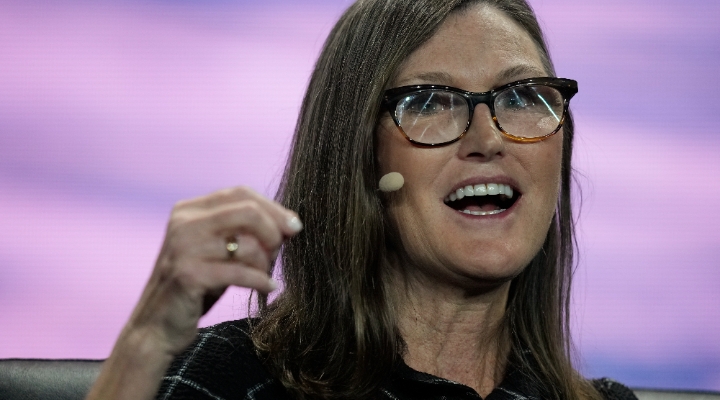
ARK Invest chief executive and chief investment officer Cathie Wood is no stranger to contrarian viewpoints - even if they resulted in some of the poorest-performing funds of the past decade.
As always, however, past performance doesn't necessarily indicate future performance. So let's hear her out. In ARK's annual research paper – Big Ideas 2024: Disrupting the Norm, Defining the Future – the firm outlines the sectors it expects will transform global economic activity. But it also makes a number of bold claims ranging from the predictable to the outright contentious.
So, what are these ideas, and will they create a blissful existence or a dystopian nightmare?
Claim #1: AI is Bringing The Slackers to Heel
In ARK's view, artificial intelligence (AI) has already boosted productivity. That's amid a debate about the quality of AI applications and the impact of the world of machine learning on jobs. But according to ARK, helping "underperforming" workers to do better.
"Coding assistants like GitHub Copilot and Replit AI are early success stories that have boosted the productivity and job satisfaction of software developers," ARK says.
"AI-powered assistants are [also] increasing the performance of knowledge workers and, interestingly, benefiting underperforming workers relatively more than high performers".
Claim #2: Your Manager Should Hold Bitcoin
In our special week of content on the topic of governance, we asked whether cryptocurrency (and specifically Bitcoin) was ungovernable. From a governance perspective, ARK describes Bitcoin as "decentralised and community-driven", leveraging open-source software for decision making. That's one take! Morningstar has long argued it lacks intrinsic value.
In a February 2022 video, Morningstar's global chief research and investment officer Dan Kemp reminded investors that "some things appear to have a value just because they are popular. But as with all fashions, that popularity can disappear overnight and suddenly you find the thing that you thought had value doesn't really".
ARK disagrees. In its view, digital assets like Bitcoin are an asset class in themselves that derive intrinsic value from the digital economy. And institutional investors should own them. It even goes so far as to say fund managers could have improved their risk-adjusted returns in 2023 by holding it. According to its research, portfolios seeking to maximise risk-adjusted returns could have allocated 19.4% to Bitcoin in 2023 due to its performance.
Claim #3: Early Days Yet For VR and The Metaverse
Although big companies like Apple and Meta have launched digital headsets, there is still some hesitancy around virtual reality, ARK says. Remember October 2022 and the controversy over just how un-virtual the legs were in Meta's Metaverse demo?
Meta Quest, for instance, only offers a fraction of the apps the iPhone did in the first five years after its initial launch. ARK also observes Meta has only sold 27 million Quest units – a mere 18% of the 146 million iPhones Apple sold cumulatively five years after launch.
Claim #4: Curing Rare Disease Could be Lucrative
Elon Musk isn't the only one combining technology with medical intervention.
Ark is excited about the development of what it calls "precision therapies", inclduing gene editing medicines, which it says have the potential to cure rare genetic diseases that are currently untreatable. For this it cites sickle cell disease (SCD), the rare inherited blood disorder it says could be cured with precisely this approach.
"SCD is an inherited red blood cell disorder that affects more than 100,000 people in the US and 20 million people globally, primarily in Africa," it says.
"Today, therapeutics account for ~16% of the total spent on treating SCD disease in the US, but they have done little more than manage symptoms, as the life expectancy of SCD patients is only 56% that of the general population".
But why stop there?
In a stunning statement of the obvious, ARK has come to the realisation that "curing all rare diseases would be valuable".
"Theoretically, curing all rare diseases would shift most of the costs to medication, obviating the need for in- and out-patient disease management, underscoring the value of a cure," it observes.
Claim #5: The EV Revolution Will Complete by 2030
Self-driving cars; autopilots; robotaxis. All of these are the future, according to ARK. It expects that, with the rise of robotaxi platforms and with electric vehicles (EVs), EV sales will grow 33% at an annual rate over the next seven years, from roughly 10 million in 2023 to 74 million in 2030.
Battery costs are also falling after a period of rising prices due to supply chain disruptions, it adds, which in turn should drive EV prices lower. That could increase growth in unit sales as EVs become more affordable. Ark points to Tesla's rise in the absence of an established supply chain, which gave it no choice but to vertically integrate.
But as we know from the Tesla case, the market factors that made the Elon Musk-led company the biggest US equity talking point of 2021 won't necessarily work in favour of competitors like Rivian, whose pure-play business model could fail to convince US citizens in harder-to-reach rural areas.
Claim #6: AI Can Out-Fly USAF's Top Guns
Sticking with the theme of transport, it's not just cars that will sit in the throes of the technology revolution. ARK's research finds AI is beating human pilots and drivers, and will encourage regulators to approve of certain autonomous operations. AI pilots have data advantages over their human counterparts, it says. According to research, Zipline drones log more commercial flight miles than humans can.
The terrifying military implications are also in the crosshairs. In simulated F-16 dogfights with a human expert fighter pilot, AI copilot Shielded AI won the fight. And in drone races, AI outperformed professional human pilots 15 out of 25 times, producing lap times that were 10% faster. Hand in your epaulettes at the departure lounge!
Claim #7: Reusable Rockets Will Revolutionise Travel
This was Musk's vision from the get-go. Perfect a re-usable commercial rocket and you bring the cost of space travel to heel. ARK is bullish too, citing SpaceX's Falcon 9 as the best example of a company ending soaring launch costs. Falcon 9 was reused numerous times, and the initial stages of re-use cost less than $1 million, ARK says. Rocket turnaround time is now proportional to costs, it adds.
It also sees knock-on effects for satellite connectivity and hyper-sonic flight, the latter of which could achieve revenues of around $35 billion by the end of the decade. At scale, hypersonic flight could reach revenues of $350 billion, it says.
Claim #8: This Town is Big Enough For The Both of us
We'll finish where we began: with machines.
ARK observes a potential explosion in robot deployment, with man-made machines outperforming humans in tasks in multiple arenas. The cost of robots has been dropping 50% for every cumulative doubling in production, ARK says, and technological advances mean robot performance has improved 33-fold over the last seven years.
The best bit? Humans and robots will work together in harmony, ARK argues, and in factories as well as in the home.
Cup of tea? "I'll put the kettle on." "Kettle already engaged, sir". *bleeps*







:quality(80)/cloudfront-us-east-1.images.arcpublishing.com/morningstar/TUMESES6KBGRBCCTKOV26XSHNA.png)
.jpg)












